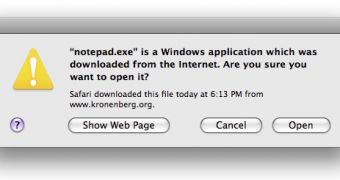Apple's move to Intel architecture opened up a whole new world of possibilities, and it was not long before software, such as Parallels, VMWare and Boot Camp, came and made lots of those possibilities reality. Now, with Leopard released, new information about how the Mac OS reacts to Windows executable has come to light.
The abundance of speculation has been spurred by two independent reports. The first, a thread on the Wine mailing labeled 'Interesting Behavior of OS X', has Steven Edward's describing that Leopard has an undocumented loader for Portable Executables, which are used in 32-bit and 64-bit versions of Windows. Of the various observations, the most important one is that Leopard will actually try to find required Windows DLL files, when attempting to load a Windows binary. The second reports /rc/etc blog and describes a peculiar warning dialogue that appears when trying to open one of the default applications, which comes with Darwine. For some reason, Apple feels the need to clearly inform the user that they are attempting to run a Windows application, something that it has never done before.
Opinions on the subject are, as usual, very mixed. Apart from the strategic sense of such a move and the very real risk of stifling all native development for the platform, the issue of technical complexity is the most important one. Many other projects have been trying to accomplish this feature for many years, with only limited success. While Apple would certainly be better suited, this would be a massive undertaking, and then there would be all the containment issues related to things, such as viruses and malware that OS X would have to deal with.
One possible explanation is that this is nothing, simply a result of EFI adoption. While this behavior was indeed not present in Tiger, this could very well be because EFI support in Tiger was basic, just enough to be able to make everything run, while Leopard fully supports it.
All things considered, if there is anything to be made out of this, it would make the most sense that Apple is working on Direct X support. This would mean that games could run on OS X with minimal tweaking, rather than with a serious conversion form Direct X to OpenGL. At the same time this would in no way impact development for the two platforms, as hardly anyone makes native Mac games.

 14 DAY TRIAL //
14 DAY TRIAL //